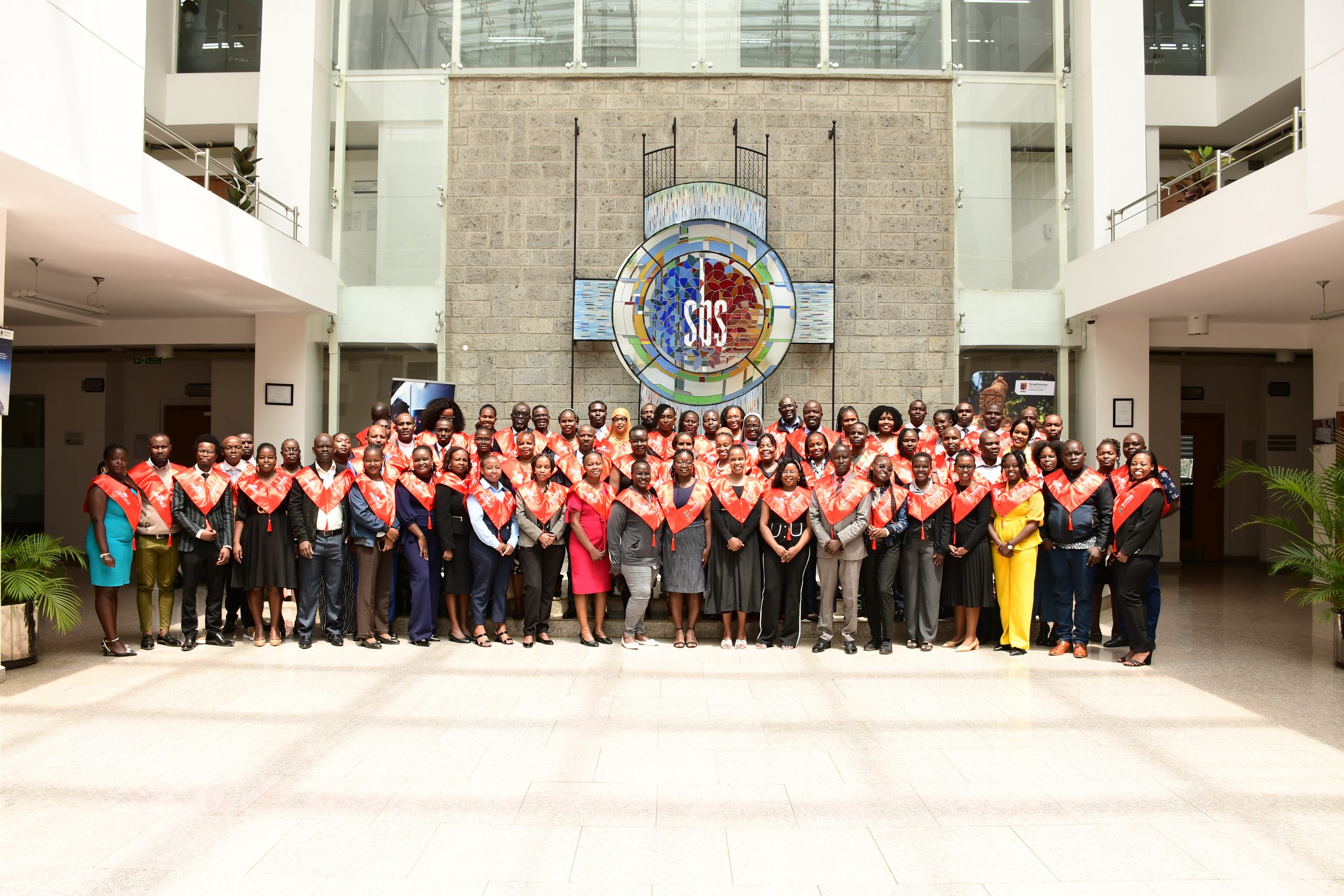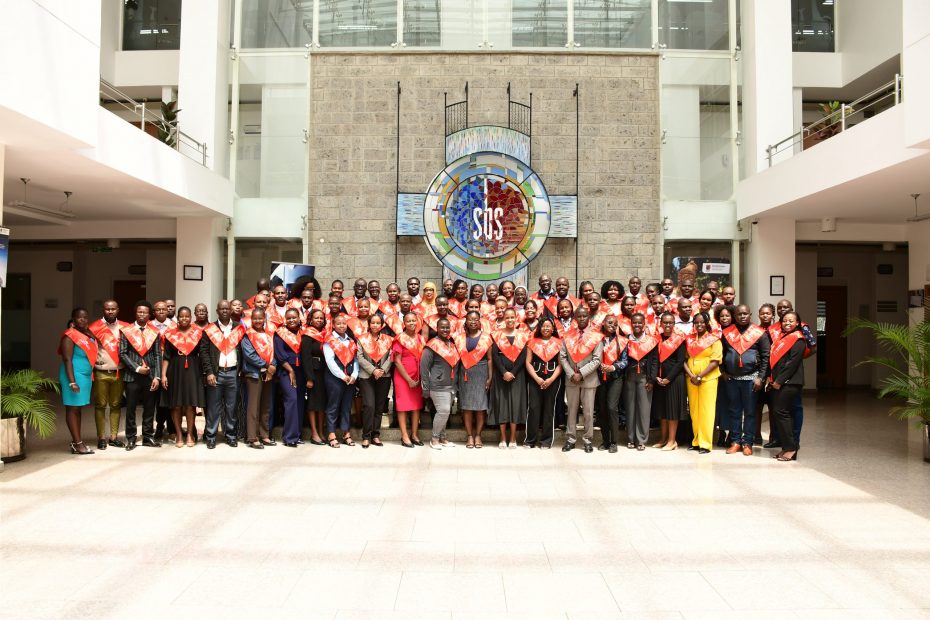2025 eMsingi Graduation

Empowering Educators for a Changing World: Inside the 2025 eMsingi Graduation

The Strathmore Institute of Management, in partnership with the Community Service Centre, marked a milestone this week as over 70 teachers representing various regions in Kenya graduated from the eMsingi Programme at the SBS TransCentury Auditorium. The event was a forum for deep conversations about the future of education, the role of technology, and the urgent need to protect children’s rights in and beyond the classroom.
Opening the ceremony, Mr. Luis Borallo, Director of the Community Service Centre, traced the origins of eMsingi. “Thirteen years ago, we began Macheo as a high school mentorship programme,” Borallo recalled. “While working with students, we saw gaps in teacher capacity. We launched Project Tai in Kitui, engaging over ten schools on parental and teacher training. The demand kept growing, especially from educators outside Nairobi. eMsingi was born from that demand.”
Today, the eMsingi programme equips teachers with skills in Educational Management Technology & Competency-Based Education (CBE) and Child Rights & Protection preparing them to navigate an ever-evolving education landscape.
Echoing similar sentiments was Dr. Stephen Macharia from the School of Humanities and Social Sciences, who drew on 42 years of classroom experience. “We can have the best curriculum and the best students, but if the teacher is not at their best, all is in vain,” he said. “An excellent teacher today is open-minded, adaptable, and willing to grow alongside students who are already ahead in technology.” He emphasised that basic technology skills are now essential for 21st-century teaching. “Technology has everything to do with everything: innovation, communication, problem-solving. Even if your environment lacks tech resources, you can still make a difference.”
A round table discussion on Educational Management, Technology & CBE Moderated by Dr. Macharia, the discussion brought together Dr. Elizabeth Gachenga, Dr. Alfred Kitawi, Dr.
Harry Bett, and Mr. Ian Wairua to explore the challenges and opportunities of integrating technology in education. On the future of teaching with AI Dr. Kitawi outlined three scenarios: Best case: Universal access to technology, AI-driven learning, and student-led education. Current reality: Unequal access between schools and worst case:No resources, no technology, and reliance on outdated methods.
A concern on how teachers and learners in resource-constrained areas should therefore be represented in the AI conversation, Mr. Wairua suggested using offline-friendly tools (e.g., UNESCO-COLIgREE), creating device-sharing systems through partnerships with local communities, and offering lesson tasks in multiple formats. “Plan for the worst-case scenario so learning continues regardless of circumstances,” he urged.
For Human Connection in a Digital World, Dr. Bett cautioned against over-reliance on tech: “If we surrender our life to a tool, we lose it; if we use it wisely, we gain.” He called for intentional engagement with students, blending technology with meaningful human interaction.
School leadership and Mindset.
The panel agreed that school leaders need openness, critical thinking, and at least basic tech skills. As Dr. Bett put it: “Educators in this century must be lifelong learners.” A second round table featured Child Rights and Protection which was unanimously agreed by the panelists as a shared responsibility. This round table brought Elvis Cosmos, Georgina Kingori,Victor Olum, Naomy Kemei together, and Elizabeth Radina, as the moderator to address child protection in schools.
But a question arised: How should teachers recognise signs of abuse? The panel highlighted common indicators: anxiety, sudden behaviour changes, and a child repeatedly seeking a teacher’s attention.
Naomy Kemei stressed that African cultural values remain vital in shaping approaches to child rights and protection. “Culture is the foundation of identity , but it must be balanced with safeguarding the dignity and voices of children.” she said.
This panel unanimously concluded that; Protecting children is everyone’s responsibility and not just teachers or parents.
A key moment came when Hon. Jacquline Kibosia, National Council for Children’s Services and the Chief Magistrate at Makadara Law Court gave her remarks as the keynote speaker of the graduation. “It’s not enough for children to know their rights, they must also understand how to act on them.” She said. She also urged teachers to empower children with practical tools for self-protection. “Teach students how to report. The 116 helpline is free and has counsellors online. Teachers can only be reporters, not counselors. Create safe spaces where children feel heard.” Her words underscored the urgency of translating knowledge into action, and equipping children with not just rights, but also pathways to safety.
The awaited moment finally arrived, the calling of the graduates. Excitement filled the room as graduates stepped forward one by one to be recognized for their dedication and hard work. Certificates were given in three flagship areas: Emerging Technologies, Child Rights, and Educational Management, each representing a powerful pillar of transformation in the education sector.
The graduation ceremony was then closed with parting shorts from: Dr. Gachenga left graduates with a moral challenge: “Push for the moral fabric of the country’s ethos must be at the heart of education.” Mr. Wairua encouraged: “Master the tools, fill the gaps, and offer what you have with empathy.” Dr. Kitawi reminded them: “A leader knows the way, shows the way, and goes the way without leaving anyone behind.”
This graduation was not only a celebration, but also a challenge; to be tech-savvy, child-protective, and community-minded educators in a rapidly changing world. As the graduates left with certificates in hand, they also carried the weight of their new roles: Children’s Rights Champions and leaders of educational transformation in Kenya.
For more information please visit: https://emsingi.org/index.php/psychosocial-support/
Contact information: communications@emsingi.org | Facebook: @E-Msingi | Instagram: @e-msingi-project